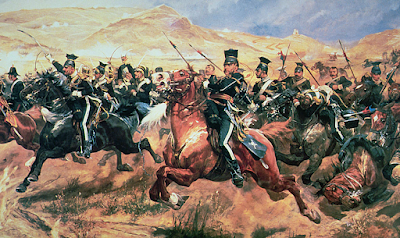Crimean War II
With the War in Ukraine well into it's second month, many so called experts have been amazed by the success of the Ukrainian Army. And as of this week, Russians are retreating in the north. Perhaps most distressing are the troops who were told to camp in the Red Forest, the area around Chernobyl that was the most effected by the nuclear explosion that happened there in 1986. The Russians apparently paid no attention to the warning signs and now an undisclosed number of them have radiation sickness. They were using the site to bombard Kiev with relative impunity from return missile fire.
With the Russians retreating in the north, they are now moving more troops and war-ware into the Donbas region which has been in war since 2014 when the Russians took the navel base in Crimea.
But the roots of this war started five years before that. This from Wikipedia:
In 2009, Russian/Republican supported President Yanukovych announced his intent to again run for president in the 2010 Ukrainian presidential election, which he subsequently won. In November 2013, a wave of large, pro-EU protests erupted in response to Yanukovych's sudden decision not to sign the EU–Ukraine Association Agreement, instead choosing closer ties to Russia and the Eurasian Economic Union.
The Verkhovna Rada (Ukrainian Legislature) had overwhelmingly supported the agreement with the EU. Russia had put pressure on Ukraine to reject it.
On 21 February 2014, Yanukovych and parliamentary opposition leaders signed an agreement calling for an interim government and early elections. The following day, Yanukovych fled Kyiv and later Ukraine; the Ukrainian parliament subsequently voted to remove him from office.
In 2021, Putin refused offers from Ukrainian president Volodymyr Zelenskyy for high-level talks, and the Russian government subsequently endorsed an article by former president Dmitry Medvedev arguing it was pointless to deal with Ukraine while it remained a "vassal" of the US."
So, this War has been going on for 8 years. And it now seems that it will become protracted. And what does that mean for the rest of the world?
Russia is the world's largest exporter of grains, natural gas, and fertilisers, and among the world's largest suppliers of crude oil and metals, including palladium, platinum, gold, cobalt, nickel, and aluminium. As a result of the invasion, Brent oil prices rose above $130 a barrel for the first time since 2008. They are back to around $100 today.
Germany stated that it would reduce its dependence on Russian energy imports by accelerating renewables and reaching 100% renewable energy generation by 2035. Before the invasion, the EU's energy strategy had focused more on the Green Deal and Fit for 55 plan to reduce greenhouse gas emissions by 55% by 2030. Here in the US, Biden has announced that he will sell 1 million barrels a day for 180 days from the strategic reserve to help with the pricing. However, the US consumes 20 Million a day with 14 million coming from domestic production.
At the time of the invasion, Ukraine was the fourth-largest exporter of corn and wheat, and the world's largest exporter of sunflower oil, with Russia and Ukraine together responsible for 29% of the world's wheat exports and 75% of world sunflower oil exports.
On 25 February, the benchmark Chicago Board of Trade March wheat futures contracts reached their highest price since 2012, with the prices of corn and soybean also spiking. The head of the World Food Programme warned in March that the war in Ukraine could take the global food crisis to "levels beyond anything we've seen before". A potential disruption to global wheat supplies could exacerbate the ongoing hunger crisis in Yemen and East Africa.
The supply of neon, needed for chip manufacture and lasers, will also be severely constrained by the conflict. Ukraine produces about 70% of the global neon supply, and 90% of the semiconductor-grade neon used in the United States.
The supply of krypton and xenon, of which Ukraine is also a major exporter, will be affected as well. On 31 March, in apparent retaliation against Western economic sanctions, Putin announced that Russia would stop supplying all gas to Europe the following day that was not paid for in rubles.
That move created a rally in the value of the ruble which is now back to 1.2 cents. (from .8 cents) It has fallen from 4 cents since the beginning of the Obama administration in 2008. It also fell steeply during the Crimea annexation.
In the Crimean War of the 1850s, Russia lost.
It was one of the first conflicts in which military forces used modern technologies such as explosive naval shells, railways and telegraphs. It marked a turning point for the Russian Empire. The war weakened the Imperial Russian Army, drained the treasury and undermined Russia's influence in Europe. The empire would take decades to recover.
With the invention of the javeline shoulder mounted tank killer and a host of new switchblade attack drone technologies from the west,
Russia might lose again.
And that's a problem.
Earthfamily Principles
Earthfamilyalpha you tube channel
Earthfamilyalpha Content IV
Earthfamilyalpha Content III
Earthfamilyalpha Content II
Earthfamilyalpha Content
Labels: advanced tech, nuclear war, the world
